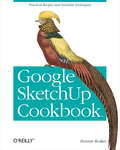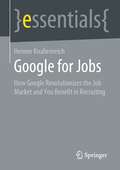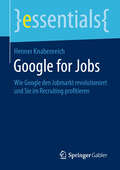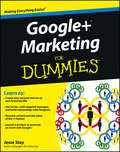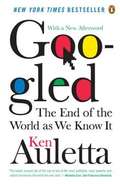- Table View
- List View
Google Inc.
by Thomas R. Eisenmann Benjamin EdelmanThe case 'Google Inc.' describes Google's history, business model, governance structure, corporate culture, and processes for managing innovation. It reviews Google's recent strategic initiatives and the threats they pose to Yahoo!, Microsoft, and others. It also asks what Google should do next. One option is to stay focused on the company's core competence, i.e., developing superior search solutions and monetizing them through targeted advertising. Another option is to branch into new arenas; for example, build Google into a portal like Yahoo! or MSN; extend Google's role in e-commerce beyond search, to encompass a more active role as an intermediary (like eBay) facilitating transactions; or challenge Microsoft's position on the PC desktop by developing software to compete with Office and Windows.
Google Inc. (Abridged)
by Thomas R. Eisenmann Benjamin EdelmanDescribes Google's history, business model, governance structure, corporate culture, and processes for managing innovation. Reviews Google's recent strategic initiatives and the threats they pose to Yahoo, Microsoft, and others. Asks what Google should do next. One option is to stay focused on the company's core competence, i.e., developing superior search solutions and monetizing them through targeted advertising. Another option is to branch into new arenas, for example, build Google into a portal like Yahoo or MSN; extend Google's role in e-commerce beyond search, to encompass a more active role as an intermediary (like eBay) facilitating transactions; or challenge Microsoft's position on the PC desktop by developing software to compete with Office and Windows.
Google Inc. in 2014
by Thomas R. Eisenmann Benjamin EdelmanThe case 'Google Inc. in 2014' describes Google's history, business model, governance structure, corporate culture, and processes for managing innovation. Reviews Google's recent strategic initiatives and the threats they pose to selected competitors. Asks what Google should do next.
Google SketchUp Cookbook: Practical Recipes and Essential Techniques
by Bonnie RoskesAs the first book for intermediate and advanced users of Google SketchUp, this Cookbook goes beyond the basics to explore the complex features and tools that design professionals use. You'll get numerous step-by-step tutorials for solving common (and not so common) design problems, with detailed color graphics to guide your way, and discussions that explain additional ways to complete a task. Google SketchUp Cookbook will help you:Use SketchUp more efficiently by taking advantage of components and groupsLearn new techniques for using Follow Me, Intersect, and constraintsGo beyond simple textures with tools such as texture positioning and Photo MatchCreate animations and walkthroughs, and explore design scenarios by using layers and scenesLearn how to use styles to customize your presentationsCombine SketchUp with the 3D Warehouse and Google EarthGoogle SketchUp Cookbook is ideal for architects, engineers, interior designers, product designers, woodworkers, and other professionals and hobbyists who want to work more efficiently and achieve true mastery of this amazing tool.
Google Speaks: Secrets of the World's Greatest Entrepreneurs, Sergey Brin and Larry Page
by Janet LowePraise for Google Speaks "It's not hard to see that Google is a phenomenal company. . . . At Geico, we pay these guys a whole lot of money for this and that key word. " -Warren Buffett "Google rocks. It raised my perceived IQ by about 20 points. " -Wes Boyd, President of Moveon. Org "Google is my rapid response research assistant. It's the Swiss Army knife of information retrieval. " -Lloyd Grove, columnist, Portfolio. com "Who's afraid of Google? Everyone. " -Wired magazine "Writers of the past had absinthe, whiskey or heroin. I have Google. " -Michael Chabon, author of The Amazing Adventures of Kavalier and Clay
Google Workspace User Guide: A practical guide to using Google Workspace apps efficiently while integrating them with your data
by Balaji Iyer Abhi JeevaganambiExplore the suite of apps that enhance productivity and promote efficient collaboration in your businessKey FeaturesSet up your own project in Google Workspace and improve your ability to interact with different servicesUnderstand how a combination of options can help businesses audit their data to be highly secureDeploy Google Workspace, configure users, and migrate data using Google WorkspaceBook DescriptionGoogle Workspace has evolved from individual Google services to a suite of apps that improve productivity and promote efficient collaboration in an enterprise organization.This book takes you through the evolution of Google Workspace, features included in each Workspace edition, and various core services, such as Cloud Identity, Gmail, and Calendar. You'll explore the functionality of each configuration, which will help you make informed decisions for your organization. Later chapters will show you how to implement security configurations that are available at different layers of Workspace and also how Workspace meets essential enterprise compliance needs. You'll gain a high-level overview of the core services available in Google Workspace, including Google Apps Script, AppSheet, and Google Cloud Platform. Finally, you'll explore the different tools Google offers when you're adopting Google Cloud and migrating your data from legacy mail servers or on-premises applications over to cloud servers.By the end of this Google Workspace book, you'll be able to successfully deploy Google Workspace, configure users, and migrate data, thereby helping with cloud adoption.What you will learnManage and configure users in your organization's Workspace accountProtect email messages from phishing attacksExplore how to restrict or allow certain Marketplace apps for your usersManage all endpoints connecting to Google WorkspaceUnderstand the differences between Marketplace apps and add-ons that access Drive dataManage devices to keep your organization's data secureMigrate to Google Workspace from existing enterprise collaboration toolsWho this book is forThis book is for admins as well as home users, business users, and power users looking to improve their efficiency while using Google Workspace. Basic knowledge of using Google Workspace services is assumed.
Google and Earnings Guidance
by Francois Brochet David KironThe case explores Google's communication strategy with Wall Street analysts. In particular, the case focuses on Google's commitment to a no-guidance policy and provides an overview of guidance practice among major U.S. companies.
Google for Jobs: How Google Revolutionizes the Job Market and You Benefit in Recruiting (essentials)
by Henner KnabenreichAlmost all search queries are now made via Google and the search for a new job via Google is also increasing steadily. Thanks to Google for Jobs, Google's claim to offer users the best search experience is now also evident in the job search. Henner Knabenreich presents the most important findings about Google for Jobs and provides important tips and hints for successful use. He shows that companies benefit from an unprecedented opportunity to provide reach - regardless of size, industry and job description. To bring applicants and companies together in the best and fastest possible way is Google's claim. Find out how you as an employer can benefit from this job search here.The author:Henner Knabenreich has been working on the career pages and application processes of employers since 2003. As an “employer branding optimizer”, he advises companies on the implementation of career websites, has been promoting the role of SEO in the context of recruiting for years and observes Google's activities in the job market. He is author of the book "Career Websites with Wow! effect" and blogs on an influential HR blog. This Springer essential is a translation of the original German 1st edition essential, Google for Jobs by Henner Knabenreich published by Springer Fachmedien Wiesbaden GmbH, part of Springer Nature in 2019. The translation was done with the help of artificial intelligence (machine translation by the service DeepL.com). A subsequent human revision was done primarily in terms of content, so that the book will read stylistically differently from a conventional translation. Springer Nature works continuously to further the development of tools for the production of books and on the related technologies to support the authors.
Google for Jobs: Wie Google den Jobmarkt revolutioniert und Sie im Recruiting profitieren (essentials)
by Henner KnabenreichNahezu alle Suchanfragen erfolgen heute über Google und auch die Suche nach einem neuen Job via Google steigt stetig an. Googles Anspruch, Nutzern das beste Sucherlebnis zu bieten, zeigt sich dank Google for Jobs nun auch in der Stellensuche. Henner Knabenreich stellt die wichtigsten Erkenntnisse zu Google for Jobs dar und vermittelt wichtige Tipps und Hinweise für die erfolgreiche Nutzung. Er zeigt, dass Unternehmen von einer nie da gewesenen Möglichkeit profitieren, für Reichweite zu sorgen – unabhängig von Größe, Branche und Berufsbild. Bewerber und Unternehmen best- und schnellstmöglich zusammenzubringen, ist Googles Anspruch. Wie Sie als Arbeitgeber von dieser Jobsuche profitieren, erfahren Sie hier.Der Autor: Henner Knabenreich beschäftigt sich seit 2003 mit den Karriereseiten und den Bewerbungs-Prozessen von Arbeitgebern. Als Arbeitgebermarkenauftrittsoptimierer berät er Unternehmen bei der Umsetzung von Karriere-Websites, propagiert bereits seit Jahren die Rolle von SEO im Kontext Recruiting und beobachtet Googles Aktivitäten im Jobmarkt. Er ist Autor des Werks „Karriere-Websites mit Wow!-Effekt und bloggt auf einem einflussreichen HR-Blog.
Google in China (A)
by John A. Quelch Katherine E. JoczIn January 2010, Google threatened in a public statement to stop censoring its search results on its google.cn website, as required by Chinese authorities. Should Google exit China? Or attempt a compromise with the Chinese government?
Google in China (B)
by John A. QuelchIn a January 2010 public statement, Google threatened to stop censoring its search results on its Google.cn website, as required by Chinese authorities. Should Google exit China? Or attempt a compromise with the Chinese government?
Google in Europe: Competition Policy in the Digital Era (B)
by Laura Phillips SawyerSupplement to Google in Europe: Competition Policy in the Digital Era by Laura Phillips Sawyer
Google to Alphabet: Ten Things We Know to Be True
by Robert L. Simons Annelena LobbGoogle's founders wrote "10 Things We Know To be True," a document detailing founding principles and values, early in the company's life. As the company expanded, added business units, and changed its name to Alphabet, were these principles and values still valid and relevant? If not, how should they be changed? This product can be used with the free Job Design Optimization Tool (JDOT), available at: hbsp.harvard.edu/jdot
Google to Alphabet: Ten Things We Know to Be True
by Robert L. Simons Annelena LobbGoogle's founders wrote "10 Things We Know To be True," a document detailing founding principles and values, early in the company's life. As the company expanded, added business units, and changed its name to Alphabet, were these principles and values still valid and relevant? If not, how should they be changed? This product can be used with the free Job Design Optimization Tool (JDOT), available at: hbsp.harvard.edu/jdot
Google to Alphabet: Two Job Opportunities
by Robert L. Simons Annelena LobbThis product can be used with the free Job Design Optimization Tool (JDOT), available at: hbsp.harvard.edu/jdot
Google's Project Oxygen: Do Managers Matter?
by David A. Garvin Liz Kind Alison Berkley WagonfeldGoogle's Project Oxygen started with a fundamental question raised by executives in the early 2000s: do managers matter? The topic generated a multi-year research project that ultimately led to a comprehensive program, built around eight key management attributes, designed to help Google employees become better managers. By November 2012, the program had been in place for several years, and the company could point to statistically significant improvements in managerial effectiveness and performance. Now executives were wondering: how could Google build on the success of this project, extending it to senior leaders, teams, and other constituencies while striving to create truly amazing managers?
Google+ Marketing For Dummies
by Jesse StayOrganize customers, craft targeted messages, or host Hangouts with Google?s social networkGoogle+ is Google's social network that has the social media world abuzz with excitement. With Google tools like YouTube, Picasa, Blogger, and Picnik being integrated with Google+, marketers will find Google+ is the best way to reach the long-time users of Google?s other tools. Google+ expert Jesse Stay shows you how to create and maximize your Google+ presence to connect with your customers.Explains how to sign up for your account and set up your brand profileShows you how to use Circles, craft targeted messages for the Stream, and add multimedia features to your postsHelps you discover content and the value of the +1 buttonShows you how to be mindful of SEO, so that your Google+ brand page can be foundAddresses using Google+ to launch a product or promote an eventConfidently enter the exciting new Google+ social neighborhood with Google+ Marketing For Dummies.
Google: To TVC or Not to TVC?
by William R. Kerr Carl KreitzbergIn late 2018, evidence emerged that many of Google's temporary help agency workers, vendors, and independent contractors ("TVCs") were unhappy with the company. TVCs, who reportedly made up 49.95% of Google's 170,000 person global workforce, had raised concerns of mistreatment, citing instances of pay inequity, social exclusion, and physical endangerment. "Flexible" workers, such as TVCs, were often seen as a key cog for Silicon Valley's IT companies: they made workforces scalable, they helped firms get access to specialized knowledge for temporary projects, and they boosted innovation by creating "knowledge spillovers" between firms. But, at the same time, many onlookers worried that flexible work arrangements were aggravating social inequality and making more jobs precarious. Google employees, major media outlets, and politicians demanded that the company change its policies on TVCs. One suggestion was that Google convert all of its TVCs to full-time status by early 2020. As tensions reportedly escalated between Google's workforce and its management team, some began to wonder if Google was still an employer of choice.
Googled
by Ken AulettaThere are companies that create waves and those that ride or are drowned by them. This is a ride on the Google wave, and the fullest account of how it formed and crashed into traditional media businesses. With unprecedented access to Google's founders and executives, as well as to those in media who are struggling to keep their heads above water, Ken Auletta reveals how the industry is being disrupted and redefined. Auletta goes inside Google's closed-door meetings, introducing Google's notoriously private founders, Larry Page and Sergey Brin, as well as those who work with - and against - them. In Googled, the reader discovers the 'secret sauce' of the company's success and why the worlds of 'new' and 'old' media often communicate as if residents of different planets. It may send chills down traditionalists' spines, but it's a crucial roadmap to the future of media business: the Google story may well be the canary in the coal mine. Googled is candid, objective and authoritative. Crucially, it's not just a history or reportage: it's ahead of the curve and unlike any other Google books, which tend to have been near-histories, somewhat starstruck, now out of date or which fail to look at the full synthesis of business and technology.
Googled
by Ken AulettaA revealing, forward-looking examination of the outsize influence Google has had on the changing media Landscape. There are companies that create waves and those that ride or are drowned by them. As only he can, bestselling author Ken Auletta takes readers for a ride on the Google wave, telling the story of how it formed and crashed into traditional media businesses?from newspapers to books, to television, to movies, to telephones, to advertising, to Microsoft. With unprecedented access to Google?s founders and executives, as well as to those in media who are struggling to keep their heads above water, Auletta reveals how the industry is being disrupted and redefined. Using Google as a stand-in for the digital revolution, Auletta takes readers inside Google?s closed-door meetings and paints portraits of Google?s notoriously private founders, Larry Page and Sergey Brin, as well as those who work with?and against?them. In his narrative, Auletta provides the fullest account ever told of Google?s rise, shares the ?secret sauce? of Google?s success, and shows why the worlds of ?new? and ?old? media often communicate as if residents of different planets. Google engineers start from an assumption that the old ways of doing things can be improved and made more efficient, an approach that has yielded remarkable results? Google will generate about $20 billion in advertising revenues this year, or more than the combined prime-time ad revenues of CBS, NBC, ABC, and FOX. And with its ownership of YouTube and its mobile phone and other initiatives, Google CEO Eric Schmidt tells Auletta his company is poised to become the world?s first $100 billion media company. Yet there are many obstacles that threaten Google?s future, and opposition from media companies and government regulators may be the least of these. Google faces internal threats, from its burgeoning size to losing focus to hubris. In coming years, Google?s faith in mathematical formulas and in slide rule logic will be tested, just as it has been on Wall Street. Distilling the knowledge accrued from a career of covering the media, Auletta will offer insights into what we know, and don?t know, about what the future holds for the imperiled industry.
Gorbachev: On My Country and the World
by Mikhail GorbachevHere is the whole sweep of the Soviet experiment and experience as told by its last steward. Drawing on his own experience, rich archival material, and a keen sense of history and politics, Mikhail Gorbachev speaks his mind on a range of subjects concerning Russia's past, present, and future place in the world. Here is Gorbachev on the October Revolution, Gorbachev on the Cold War, and Gorbachev on key figures such as Lenin, Stalin, and Yeltsin. The book begins with a look back at 1917. While noting that tsarist Russia was not as backward as it is often portrayed, Gorbachev argues that the Bolshevik Revolution was inevitable and that it did much to modernize Russia. He strongly argues that the Soviet Union had a positive influence on social policy in the West, while maintaining that the development of socialism was cut short by Stalinist totalitarianism. In the next section, Gorbachev considers the fall of the USSR. What were the goals of perestroika? How did such a vast superpower disintegrate so quickly? From the awakening of ethnic tensions, to the inability of democrats to unite, to his own attempts to reform but preserve the union, Gorbachev retraces those fateful days and explains the origins of Russia's present crisis. But Gorbachev does not just train his critical eye on the past. He lays out a blueprint for where Russia needs to go in the next century, suggesting ways to strengthen the federation and achieve meaningful economic and political reforms. In the final section of the book, Gorbachev examines the "new thinking" in foreign policy that helped to end the Cold War and shows how such approaches could help resolve a range of current crises, including NATO expansion, the role of the UN, the fate of nuclear weapons, and environmental problems.Gorbachev: On My Country and the World reveals the unique vision of a man who was a powerful actor on the world stage and remains a keen observer of Russia's experience in the twentieth century.
Gordon Bethune at Continental Airlines
by Nitin Nohria Anthony J. Mayo Mark BensonA $385 million loss for the final months of fiscal year 1994 signaled Continental might go bankrupt. Could new CEO Gordon Bethune turn Continental around? Continental was in dire straits because the deregulation of the commercial airline industry in 1978 ushered in a new era focused on mergers and acquisitions and bitter employee-management relations. Venerable airline brands with a commitment to quality, like Continental, were prime takeover targets. After Texas Air Chairman Frank Lorenzo (HBS 1963) secured Continental in his hostile takeover bid, tensions escalated between Lorenzo and the old guard--especially when Lorenzo declared Continental bankrupt in the fall of 1983 and then fired and replaced half his staff with cheaper nonunion labor. In October 1994, five months after Continental exited its second bankruptcy, Bethune was elevated to CEO and created a Go Forward Plan to return Continental to profitability. Two years after unveiling the Go Forward Plan, Continental was at the top of the industry in a number of important performance metrics.
Gordon Brothers: Collateralizing Corporate Loans by Brands
by Paul M. Healy Maria LoumiotiThe case explores the collateralization of intellectual property in a loan agreement between a highly leveraged apparel company and a large US bank. Leveraging intangibles in the credit market is a new practice that has significantly grown over the past few years. However, estimating their liquidation value is not directly intuitive, since intangibles are highly illiquid assets and have uncertain future cash flows. Can banks reliably secure corporate loans by intellectual property, and how can they alleviate the challenges in estimating a loan-to-value ratio for this collateral?

